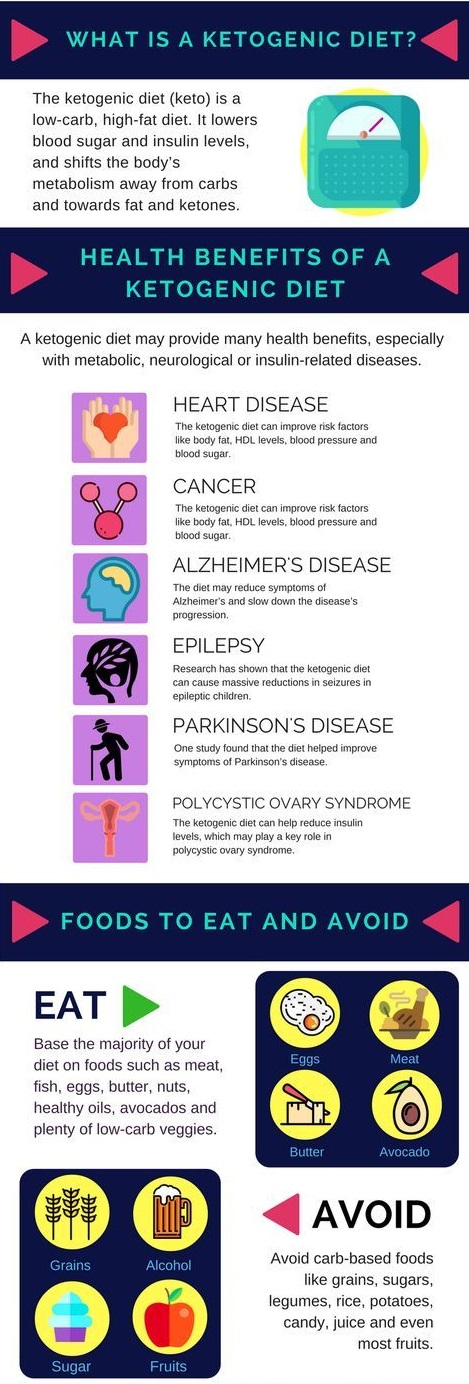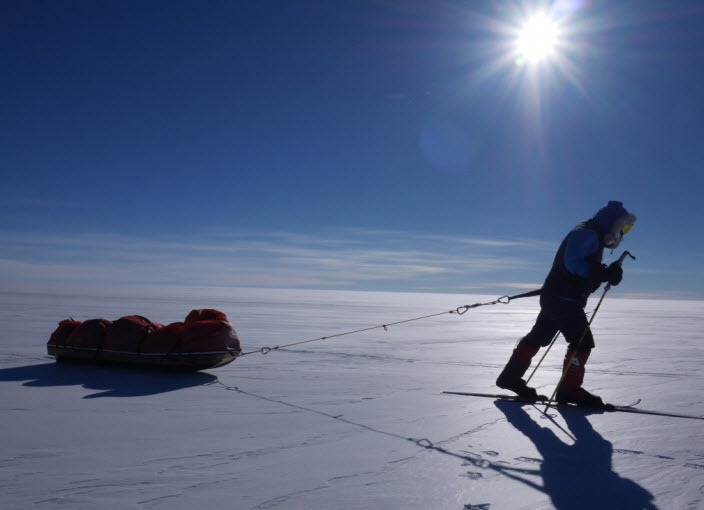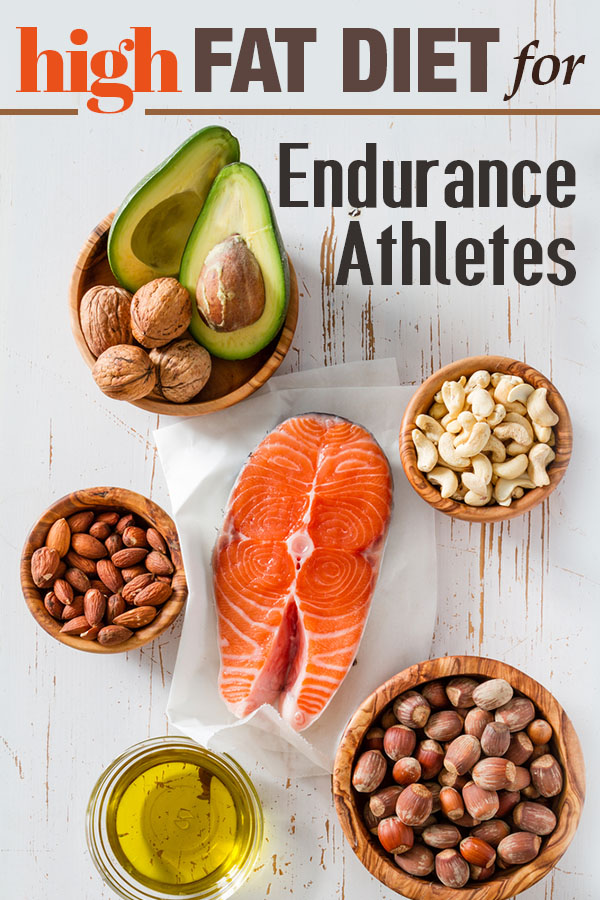Is a High Fat Diet Beneficial for Endurance Athletes

When I originally began sharing research about high fat diets for endurance athletes in 2014, it was still a bizarre concept that left most saying, no, no no. {myself included}
But as with many things, we learn more and then have to make new (and more informed) decisions.
Now trusted fitness professionals like Professor Tim Noakes, Ben Greenfield and Tim Ferriss are touting the benefits of ketosis, which has brought high fat, low carb diets for athletes in to the spotlight.
Fat-adaptation involves carbohydrate restriction with a big increase in fat consumption to induce the physiological shift necessary for the body to "switch" to burning "fat as fuel" at much higher rates.
But still…is it what you should be doing?
Why High Fat for Runners?
Once we get past the notion that a high fat diet isn't a bad thing for athletes, we then can breakdown all the reasons it's a GOOD thing, and how we benefit from this diet.
What's so great about being fat-adapted or in ketosis? Reportedly:
- Body uses fat for fuel, no need for all those carbs while training and racing
- Weight remains stable
- Hunger decreases
- Cancer cells are starved without the sugars and carbs
- Energy increases
- Keeps blood sugar stable, and increases metabolism
- Endurance increases, removing the dreaded bonk
- Improves recovery and reduces inflammation
LeBron James reportedly lost 25 pounds and improved his game day endurance by cutting carbs and sugars from his diet and increasing total fat.  Adapted from source
Adapted from source
Thanks to constantly improving technology, athletes have been able to test out all kinds of new nutrition and training techniques thanks to facilities like GSK Human Performance Lab (GSKHPL). {Seriously I want to be awesome enough to go here and get evaluated!}
Facilities dedicated to understanding human performance are surely why we continue to see new events that test our limits, long standing records breaking and redefining limits to what we can really achieve physically.
Intense Testing of High Fat: Scott Expedition
One endurance event that caught my attention was the Captain Scott's expedition. Both for the event itself reminding me that my running is not so crazy, and also because of how he utilized this high fat idea.
British adventurers Ben Saunders and Tarka L'Herpiniere endured 105 days in Antarctica completing an 1800-mile trek {the equivalent of 69 marathons back-to-back} from the coast of Antarctica to the South Pole and back. <<AND BACK?!
How many of you would have gotten to the Pole and been like cool, peace out! I mean, wow!

Ben is a professional explorer and one of only three people in history to ski solo to the North Pole {at the grand old age of 26}.
"The journey has been a mammoth undertaking that has tested the bounds of our bodies and minds each and every day. This (the Scott expedition) was always going to be a journey that explored human performance, our limits of endurance and our physical and mental potential as human beings."
Working with the sports scientists and performance nutritionists from GSK science to improve his preparation, Ben trained for this extreme challenge for over a year…and of course, 10 years of previous endurance event experience also helped him train.
According to Ben, his training focused on prepping for these insane conditions:
- Adverse weather conditions (white outs and frostbite)
- Sleep deprivation (skiing for 9 hours, camp workout at least 2 hours and sleep 5 hours daily)
- Fatigue/exhaustion (from pulling 400 pound food heavy sleds),
- Hypothermia, hypoglycemia and possible starvation
- Loneliness as a result of being isolated in such an extreme environmental.
Allison Levine talked about a trek like this in On The Edge and I mostly kept thinking…these people are nuts, but man what a phenomenal experience.

High Fat Performance Diet
Reinforcing what we're all slowing beginning to understand, these challenges made getting the right nutrition even more vital and Ben believes his work with the GSK HPL sports science team made a difference in his results.
Going far beyond drinking a special electrolyte beverage, this team created a radical nutrition plan which included diet recommendations that was extremely high-fat, compared to the standard endurance plan.
So he would go 70% fat, instead of 70% carbs…would it work?

Why did he think this might work…first historic research, second working with GSK to test it out.
But he explains it well this way "Tour de France riders don't skip eating for five hours and then finally hunker down with a stick of butter—though that's how polar expeditions typically dine."
Can you imagine doing any activity for 9 hours without really eating?! I can't.
Following a high fat diet isn't easy, as it requires keeping your total carbs below 50 grams each day. That means bye bye to breads, nearly all starchy vegetables, very few fruits and of course no sugary treats or gels fueling those runs.
Flipping standard running #nutrition on its head, why you need to understand the high fat movement Click To Tweet
Why might it work? The fat utilization theory:
- Fat burns in a carbohydrate flame (in other words don't completely deplete calories)
- What your body burns depends on: intensity, duration, fitness level, diet
- The body must convert fat to energy making it more useful for lower-intensity/long duration exercise
- Anti-inflammatory benefits from omega 3's and 6's
- Medium-Chain Triglycerides (coconut oil) are more readily available as fuel
- Endurance athletes need a higher calorie diet and fats provide a better source
- High-fat may only mean 30-35% for athletes as that is higher than the avg person
- Better trained athletes will more quickly be able to utilize fat as fuel
- Nutrient density must still be a high priority when going low-carb
Upon returning, Ben went back to GSK science lab to see how is body changed and review his dietary plan. Results of utilizing this strategy:
- No cravings
- No hunger during the working hours
- Improved muscle mass in his trunk
- Improved bone density
- Remained mentally clear and focused
- Shortened recovery time
- During days of half portions he immediately felt "shattered" – showing the quality of their full fueling plan
Many other endurance athletes have reported a lot of the same benefits. But all agree that it requires complying 100% with the low carb aspect and getting in enough good fats to feel full. There will also be a transition period where you feel sluggish, have headaches and general yuck; it's often called the keto flu.
A few more resources for those interested:
Example high fat diet (60 to 70% fat)
Ironman athlete who swears by the science of high fat
Ultra mountain runner Timothy Olson using high fat
As many of you know I'm using the Low Heart Rate training which does claim to increase fat burning {though that is not my primary focus}. I am not however switching to a super low carb diet, though I have drastically reduced them lately as part of a larger strength program and so far no downside to my running.
I think Ben's experience goes to show why we all need to be our own investigators to find out what diet will truly work best for our bodies.
Have you tinkered with the amount of carbs vs. fat in your training?
Do you pay attention to how foods effect your training, energy or mood?
Other ways to connect with Amanda
Instagram Daily Fun: RunToTheFinish
Facebook Community Chatter: RunToTheFinish
Get more running tips: Pinterest
Photo Source: Bensanders.net
Is a High Fat Diet Beneficial for Endurance Athletes
Source: https://www.runtothefinish.com/high-fat-diet-endurance-athletes/